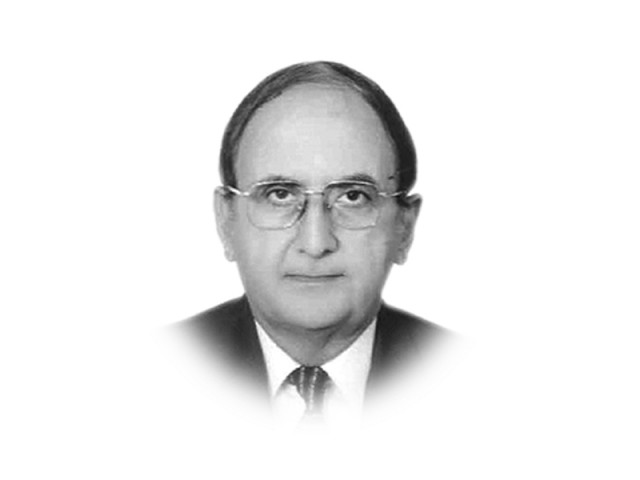Back to old politics
Mamnoon Hussain does not have much standing in the PML-N, not to speak of Pakistani politics.

The writer is an independent political and defence analyst. He is also the author of several books, monographs and articles on Pakistan and South Asian Affairs
However, the substance and quality of democracy is poor. There is a deficit of democratic culture and operational democracy. After two general elections in 2008 and 2013, one expects a greater reflection of democratic norms not only in the conduct of political parties and leaders but also at the societal level. This implies an increased emphasis on liberal constitutionalism, the rule of law, equal citizenship, religious and cultural tolerance and protection of life and property of citizens. These norms exist in a highly selective manner. Religious and cultural intolerance is on the rise, intensifying sectarian mindset and killings.
Political parties are invariably the fiefdoms of the top leaders who manifest authoritarian traits in political management, preferring loyalty over professionalism and competence. The leaders are more inclined to promote their relatives and highly obedient loyalists to counterbalance the activists with an autonomous disposition.
Consequently, the gap continues to increase between democratic rituals and democratic soul and character. Four recent political developments show that in some respects, Pakistani politics is reverting to its old ways.
First, the Pakistan Tehreek-e-Insaf (PTI) and the Muttahida Qaumi Movement (MQM) have once again entangled in rough polemics, accusing each other of wrongdoings. A couple of years back, Imran Khan launched a major effort to malign Altaf Hussain on a host of counts. Now, in 2013, when the MQM and Altaf Hussain are under pressure from the police and intelligence authorities in the United Kingdom, Imran Khan found this a convenient opportunity to relaunch his onslaught against Altaf Hussain. Both sides are on the way to launching defamation cases against each other. This increases conflict in politics, which is not helpful in addressing the problems of the common people.
Second, Nawaz Sharif and the PML-N have selected a political nonentity as their presidential candidate. No doubt, Nawaz Sharif appointed him governor of Sindh for some months during his earlier term. Mamnoon Hussain does not have much standing in the PML-N, not to speak of Pakistani politics.
Nawaz Sharif has selected a person with no autonomous political clout who will thus look towards Nawaz Sharif in all matters. The presidency will lose its autonomous stature and the prime minister will become all powerful, combining formal and informal powers.
This is going back to December 1997, when Nawaz Sharif selected a loyalist but a political lightweight, judge of the Supreme Court but he did not have any political standing inside or outside the party. He was a personal selection of Nawaz Sharif who betrayed Nawaz Sharif when General (retd) Pervez Musharraf overthrew his government by deciding to continue as the president until Pervez Musharraf forced him out of office in June 2001. We are going to have another Rafiq Tarrar in the presidency. This fits well with the operational norms of Pakistani politics where loyalty is assigned the highest premium.
Third, the PML-N is about to revive the tradition of importing people from abroad for high offices. These people return to Pakistan with a suitcase and serve in high office. When they are out of that office, they pick up their suitcase and leave the country. Mooen Qureshi and Shaukat Aziz are good examples of leadership brought in from abroad. (Both got Pakistani passports and national identity cards after coming to Pakistan). Hafiz Shaikh, who returned to Pakistan to hold a key cabinet position, is essentially based in the UAE. Now, the PML-N is said to be thinking of appointing a person as governor of the Punjab who has given up his British citizenship to ‘serve’ the people of Pakistan.
Fourth, it is unfortunate that the Pakistan Peoples Party and its allies have pulled out of the presidential elections. This decision, triggered by the Supreme Court’s orders to advance the election date at the request of the PML-N, has made the presidential election controversial. The new president will find it difficult to enjoy undisputed stature and we may also return to the old practice of the opposition boycotting or disrupting the presidential address to parliament.
There is a need of doing some dispassionate thinking on why Pakistan’s political leaders and parties cannot change their old habits and want to twist the democratic process to their advantage rather than rectifying their political behaviour on the basis of the spirit of democracy.
The PML-N has got, once again, a heavy mandate. However, the electoral mandate will be valid only for four to six months. After that the PML-N can sustain itself comfortably in power only by acquiring performance legitimacy. The government will have to deliver services to people and improve the quality of their lives. This cannot be ensured by returning to old political ways and preferring loyalists for key positions.
There is a need to go beyond the loyalists and sycophants for advice. Compare their advice with the opinions of professionals, independent minds as well as the stakeholders for evolving a realistic thinking on the problems that afflict Pakistan, which include terrorism and extremism, a faltering economy, energy shortages and how to maintain a stable relationship with the military.
Published in The Express Tribune, July 29th, 2013.
Like Opinion & Editorial on Facebook, follow @ETOpEd on Twitter to receive all updates on all our daily pieces.















COMMENTS
Comments are moderated and generally will be posted if they are on-topic and not abusive.
For more information, please see our Comments FAQ